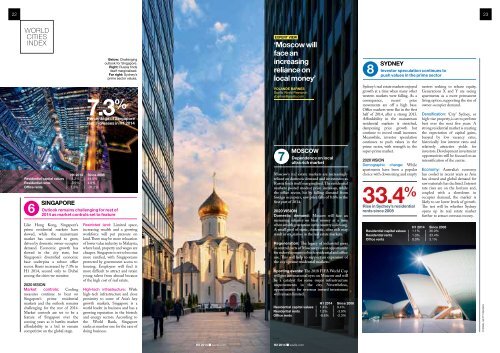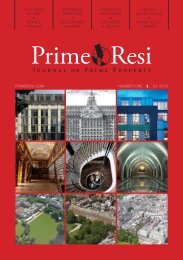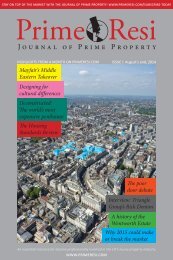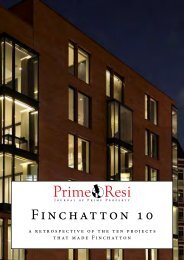Savills 12 Cities Report
Live/Work Index
Live/Work Index
Create successful ePaper yourself
Turn your PDF publications into a flip-book with our unique Google optimized e-Paper software.
22<br />
23<br />
World<br />
cities<br />
index<br />
Below: Challenging<br />
outlook for Singapore.<br />
Right: Russia finds<br />
itself marginalised.<br />
Far right: Sydney’s<br />
prime sector values.<br />
EXPERT VIEW<br />
‘Moscow will<br />
face an<br />
increasing<br />
reliance on<br />
local money’<br />
8<br />
Sydney<br />
Investor speculation continues to<br />
push values in the prime sector<br />
H1 2014 Since 2008<br />
Residential capital values -4.2% 44.6%<br />
Residential rents -3.5% 4.6%<br />
Office rents 7.3% -31.2%<br />
6<br />
Singapore<br />
Like Hong Kong, Singapore’s<br />
prime residential markets have<br />
slowed, while the mainstream<br />
market has continued to grow,<br />
driven by domestic owner-occupier<br />
demand. Economic growth has<br />
slowed in the city state, but<br />
Singapore’s diversified economic<br />
base underpins a robust office<br />
sector. Rents increased by 7.3% in<br />
H1 2014, second only to Dubai<br />
among the cities we monitor.<br />
2020 vision<br />
Market controls: Cooling<br />
measures continue to bear on<br />
Singapore’s prime residential<br />
markets and the outlook remains<br />
challenging for the rest of 2014.<br />
Market controls are set to be a<br />
feature of Singapore over the<br />
coming years as it battles market<br />
affordability in a bid to remain<br />
competitive on the global stage.<br />
7.3 %<br />
Percentage of Singapore<br />
rent increases in H1 2014<br />
Outlook remains challenging for rest of<br />
2014 as market controls set to feature<br />
Restricted land: Limited space,<br />
increasing wealth and a growing<br />
workforce will put pressure on<br />
land. There may be more relocation<br />
of lower value industry to Malaysia,<br />
where land, property and wages are<br />
cheaper. Singapore is set to become<br />
more rarefied, with Singaporeans<br />
protected by government access to<br />
housing. Employers will find it<br />
more difficult to attract and retain<br />
young talent from abroad because<br />
of the high cost of real estate.<br />
High-tech infrastructure: With<br />
high-tech infrastructure and close<br />
proximity to some of Asia’s key<br />
growth markets, Singapore is a<br />
world leader in business and has a<br />
growing reputation in the biotech<br />
and energy sectors. According to<br />
the World Bank, Singapore<br />
ranks as number one for the ease of<br />
doing business.<br />
YOLANDE BARNES<br />
<strong>Savills</strong> World Research<br />
ybarnes@savills.com<br />
7<br />
moscow<br />
Dependence on local<br />
ultra rich market<br />
Moscow’s real estate markets are increasingly<br />
reliant on domestic demand and investment as<br />
Russia finds itself marginalised. The residential<br />
markets posted modest price increases, while<br />
the office sector, hit by falling demand from<br />
foreign occupiers, saw price falls of 8.6% in the<br />
first part of 2014.<br />
2020 vision<br />
Domestic demand: Moscow will face an<br />
increasing reliance on local money at a time<br />
when wealth generation in the country is slowing.<br />
A small pool of static, domestic, ultra rich may<br />
result in stagnation in the real estate markets.<br />
Regeneration: The legacy of industrial areas<br />
in central parts of Moscow present opportunity<br />
for redevelopment to both residential and office<br />
use. This will help to support an expansion of<br />
the city’s prime residential markets.<br />
Sporting events: The 2018 FIFA World Cup<br />
will put international eyes on Moscow and will<br />
be a catalyst for some major infrastructure<br />
improvements in the city. Nevertheless,<br />
opportunities for overseas inward investment<br />
will remain limited.<br />
H1 2014 Since 2008<br />
Residential capital values 1.4% 9.4%<br />
Residential rents 1.5% -3.9%<br />
Office rents -8.6% -2.3%<br />
Sydney’s real estate markets enjoyed<br />
growth at a time when many other<br />
western markets were falling. As a<br />
consequence, recent price<br />
movements are off a high base.<br />
Office markets were flat in the first<br />
half of 2014, after a strong 2013.<br />
Affordability in the mainstream<br />
residential markets is stretched,<br />
dampening price growth but<br />
continue to record small increases.<br />
Meanwhile, investor speculation<br />
continues to push values in the<br />
prime sector, with strength in the<br />
super-prime market.<br />
2020 vision<br />
Demographic change: While<br />
apartments have been a popular<br />
choice with downsizing and empty<br />
33.4 %<br />
Rise in Sydney’s residential<br />
rents since 2008<br />
H1 2014 Since 2008<br />
Residential capital values 1.1% 36.9%<br />
Residential rents 1.0% 33.4%<br />
Office rents 0.0% 3.1%<br />
nesters seeking to release equity,<br />
Generations X and Y are seeing<br />
apartments as a more permanent<br />
living option, supporting the rise of<br />
owner-occupier demand.<br />
Densification: ‘City’ Sydney, or<br />
high-rise property, is set to perform<br />
best over the next five years. A<br />
strong residential market is creating<br />
the expectation of capital gains,<br />
buoyed by low vacancy rates,<br />
historically low interest rates and<br />
relatively attractive yields for<br />
investors. Development investment<br />
opportunities will be focused on an<br />
intensification of the centre.<br />
Economy: Australia’s economy<br />
has cooled in recent years as Asia<br />
has slowed and global demand for<br />
raw materials has declined. Interest<br />
rate rises are on the horizon and,<br />
coupled with a slowdown in<br />
occupier demand, the market is<br />
likely to see lower levels of growth.<br />
The test will be whether Sydney<br />
opens up its real estate market<br />
further to attract overseas money.<br />
Corbis, getty images<br />
H2 2014<br />
savills.com<br />
Autumn H2 2014 2014 savills.com savills.com







